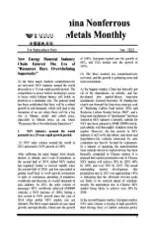Processing Trade Tariff Reductions Lead to a Decline in Copper Smelting Enterprises’ Export Cost
2012-08-15
The Notice of the Ministry of Finance and the State Administration of Taxation on Labor VAT and Consumption Tax Policy on Export Goods (Cai Shui〔2012〕39) was released.Three percent consolidated tax on copper concentrate processing export trade under the processing manual was replaced by 17% VAT. According to smm.cn (SMM), operation details on the processing trade of copper concentrate have not been released yet, and the market is still speculative about how to calculate the valueadded portion. Yet one thing is clear, the tariff reform will remarkably reduce the export cost of copper concentrate under the processing trade manual.
At the current copper price of $7500/ton LME,before the new policy was introduced, the tariff was about 1,400 yuan/ton, and under the new policy, it is 17% in the value-added portion (if calculated with the value-added processing fee). With 2012 long copper concentrate TC/RC60 USD/ton, 6.0 cents/pound; tariff is some 400 yuan/ton. Under the processing manual of the new policy, tariff on export copper concentrate decreases by 1,000 yuan/ton.
Processing trade refers to the business activity of importing all or part of the raw and auxiliary materials, parts and components, accessories,and packaging materials from abroad in bond,and re-exporting the finished products after processing or assembly by enterprises within the mainland. The finished products are sold by the foreign enterprise, and domestic enterprises collect processing charge. The definition shows that domestic enterprises undertake processing trade mainly to earn processing charge. Due to the great volatility of copper price, if tariff is equal to 3% of the price of export goods, when copper price goes up or down by 1,000 USD/ton, the expense would go up or down 30 USD/ton. Yet processing charge collected by domestic enterprises does not vary with copper price. Therefore, the tariff adjustment accords with the actualities.
杂志排行
China Nonferrous Metals Monthly的其它文章
- For Fear of Economic Slowdown,Western Regions Try to Rescue High Energy-consuming Industries like Metals with Preferential Electricity Prices
- Henan Builds a National Precious Metals Smelting Base
- Xinjiang Hongze Mining Invests 1 billion -1.2 billion yuan in a 20,000-ton Copper Mining Project
- Gansu to Speed up Construction of Non-ferrous Metal Bases for Nickel, Copper and Cobalt in Hexi Area
- Refined Aluminum Industry Suffers From Deficit and Western Investment Accelerates
- Tibet Mineral Development Teams up with Jinchuan Group to Develop Nimu Copper
